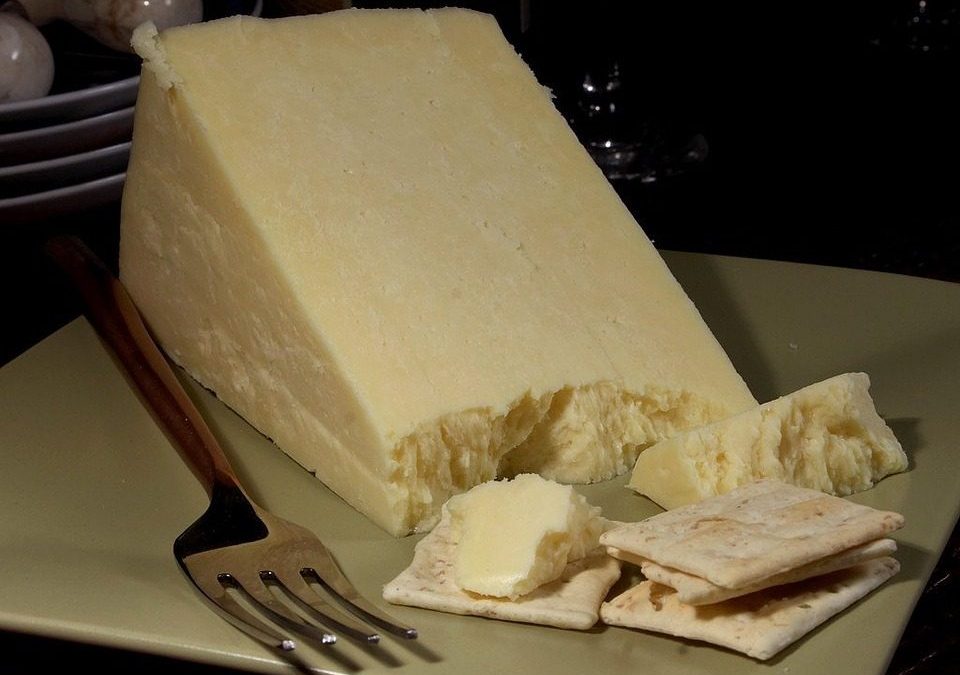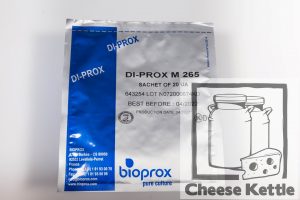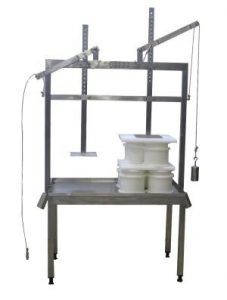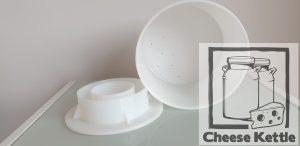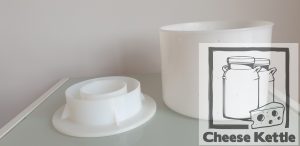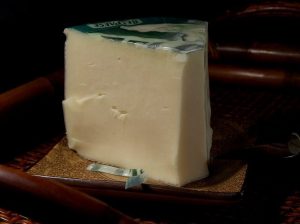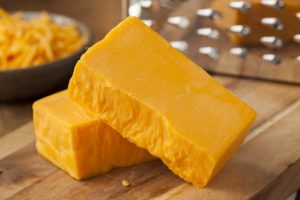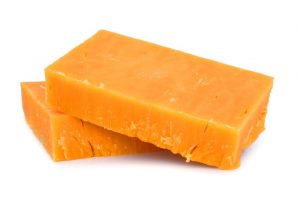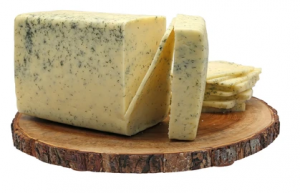Caerphilly is an aged cow’s milk cheese from that originated from the town of Caerphilly, Wales. It is an off-white semi firm cheese with a natural rind. It has a creamy taste and a supple texture. It’s gray and white rind adds an earthy, mineral flavor to the cheese.
Cook Time: approximately 2 hours and 50 minutes
Yield: approximately 800g cheese
Aging: 3 – 4 weeks
Ingredients
1) 8 L full cream cow’s milk (preferable pasteurized)
2) 1/4 tsp Bioprox 265 Mesophilic Starter Culture
3) 1 tsp liquid rennet
4) 1/8 tsp Calcium Chloride diluted in 60ml water (unchlorinated)
5) noniodized salt
Equipment
1. large pot
2. thermometer
3. curd knife and curd cutter
4. ladle or spoon for stirring
5. cheese cloth
6. cheese hoop
7. cheese press
8. kitchen timer
INSTRUCTIONS
Reminder: Sanitize all your equipment before you make cheese.
1. Heat the milk to 320 C. Add the calcium chloride. Stir well for 1 minute to thoroughly mix the Calcium Chloride.
2. Sprinkle the mesophilic culture over the surface of the milk. Let it rehydrate for a minute.
3. Stir the milk in an up and down motion for another 1 minute so the culture is thoroughly mixed with the milk.
4. Cover the pot and allow the milk to ripen for 30 minutes. Keep the temperature at 320 C.
5. While maintaining the temperature at 320 C, add the rennet. Stir the milk up and down in large loops for a minute.
6. Leave the mixture for 40 minutes to an hour, maintaining the target temperature, to allow the curds to set.
7. Check for a clean break. Poke the surface with a knife. If you can move the curd without the whey filling the space immediately, you’ll know you have a clean break.
8. Cut the curds into ¼ inch or 6 mm cubes with a curd knife (vertical cuts) and a curd cutter (horizontal cuts). Keep the size uniform as much as possible.
9. Allow the curds to heal for 5 minutes.
10. Gently stir the curds in up and down motion. Slowly increase the heat until you reach a temperature of 330 C. Continue to stir for 40 minutes to keep the curd from matting. Be sure to gradually increase the temperature using low heat during this process. Do not heat to quickly or the whey won’t separate properly.
11. Let the curds sink to the bottom of the pot for 5 minutes.
12. Line the colander with cheese cloth. Slowly ladle of pour the curds in and allow it to drain for 5 minutes.
13. Flip the curds out of the cheese cloth leaving it in the colander. Give it a firm press so it forms into a slab.
14. Leave the curds for 5 minutes.
15. Cut the curds into 2 inch thick slabs and stack it on top of each other. This helps in forming the Caerphilly’s texture. Leave the curds for 10 minutes to drain some more.
16. Using your clean hands, break the curds into thumbnail size pieces.
17. Add non iodized salt. Thoroughly mix the salt with the curds.
18. Line the cheese hoop with cheese cloth. Put the salted curds in the hoop.
19. Place the follower on top and press the cheese at a pressure at 5 kg for 10 minutes.
20. Remove the cheese from the press, take it out of the hoop, and unwrap.
21. Rub a layer of salt on the top and bottom of the cheese.
22. Bundle the cheese back and place it inside the cheese hoop. Press again at 5 kg for 10 minutes.
23. Repeat the salting process, and press for 10 kg. for 20 minutes.
24. Salt the cheese again and press at 16 kg for 16 hours.
25. Take the cheese out of the cheese hoop and air dry it for 3 to 4 days. Flip the cheese every 6 hours during this process.
26. Put the cheese in a ripening box and ripen at 130 C ay 80% to 85% humidity for 3 weeks. Make sure you flip the cheese twice a week. If any mold develops on the rind during the ripening process, simply wipe it off with brine.
In less than a month, you can already enjoy your Caerphilly. It goes well with basic white burgundy with bread and fruit. It also goes well with Chinon if you fancy a red. Some variants of Caerphilly may be aged up to a year to develop a harder texture and a sharper taste. Left to mature, its whitish molds become thicker and more leathery. Caerphilly will also become creamier with age.
Available at the Cheese Kettle Shop
Bioprox M265
Stainless Steel Mechanical Gravity Cheese Press
Cheese Hoops perfect for Caerphilly Cheese
Other Cheese Recipes You May Like
Bel Paese
Colby
Cheddar
Havarti
PRODUCT FEATURE

Australian food safety standards require most cheese products be made from pasteurized milk. If you’re looking for a high-quality milk pasteurizer for your cheese making business, Cheese Kettle has the solution for you. Our milk pasteurizer has an energy saving three coat insulated jacket made of stainless steel.
Available variations:
50 L, 100 L and 200 L milk pasteurizer
We can also customize dairy equipment based on your needs. Call us today at +61 (Australia) 02 6190 7800

